Morecambe, Heysham and The Ghost and Mrs Muir Digression
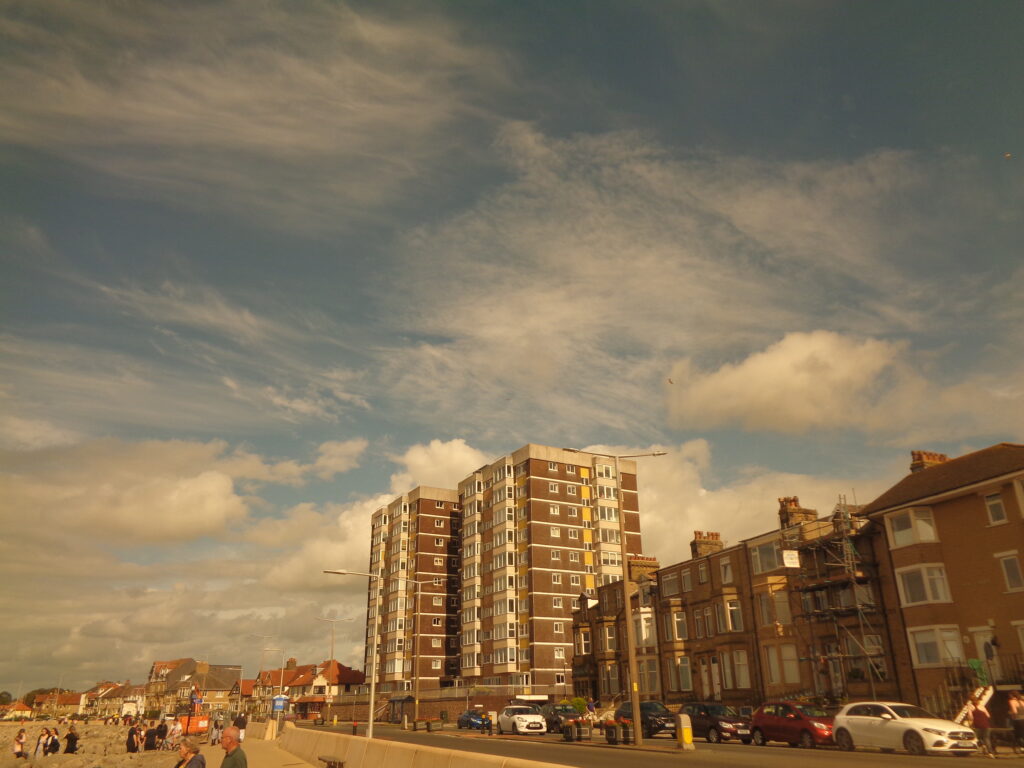
Almost the 70s, Bare, Morecambe, July 2020
Searching beyond the gaps, the scratches across the floor / The voids beyond the
architrave / Does something pull? A track a path / Summer’s early air, Christmas
and the turning year, the sleeplessness of love / These used to make sense /
Don’t ask the windows or doors / They only open to what we think we know[i]
The presence of the grid[ii], a crushing network of rubbish-filled streets, excessive dogs and their leavings, too many cars, too much noise . . . such is the lot of all deprived zones of towns and cities. I might dream of the 70s or that fantasy lodge or gatehouse detached in the landscape at the opening of a disused drive, but the reality of an urban environment is all around me. Even if this tiny room at the top of the house with a view only upwards into the sky, feels like an ivory tower or lighthouse, the car alarms crying wolf and other irritating sirens penetrate the air. Go away! Nobody needs you! We’re better off stolen or dead.
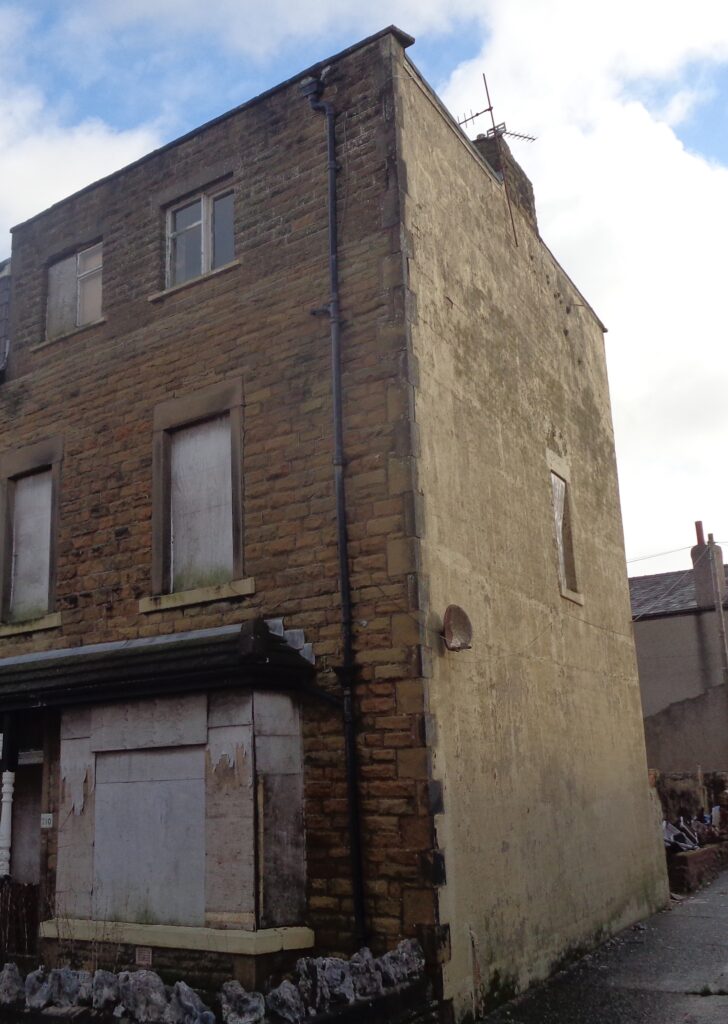
Bombed Out, 4th Feb 2022
I’m not used to living in a street. Not for years. Rural isolation covers most of my adult life: North Devon, Shropshire, Northumberland, Cumbria. With the exception of the occasional lobotomy case, a few frustrated teenagers[iii] or obnoxious kids, I wouldn’t fault the people around here, nowhere has been more friendly, but most of what I think about is escape. Outward or inward.
Realistically all those things at the lodge:
cycles, freedom, the blinding of clocks
Are they merely an effort to go back?
Yet close your eyes and there it is
I’m back. It’s easy. I’m opening the door . . .[iv]
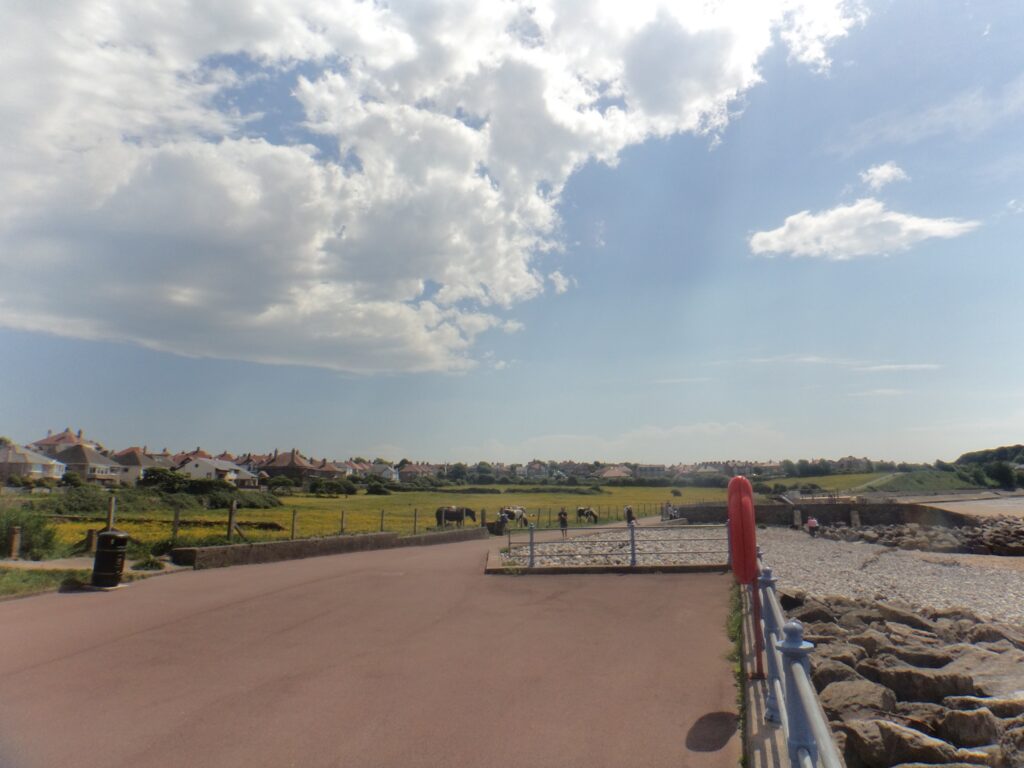
The promenade above Heysham sands looking south, May 2018
How well in 1947’s The Ghost and Mrs Muir, California stands in for an archetypal English Channel coast somewhere between Sussex and Dorset – even if many of the film’s wide dense trees are more Spanish or Mediterranean, and the tracked downland dotted with too many calm mustangs[v] or bucolic flocks of plump sheep . . .
Drifting in mind between Heysham promenade and Edwardian England via post-war California . . . it must surely be the excess of ocean sunlight, the open wilderness of unspoilt Pacific coast and the friendly daytime aspect of Gull Cottage[vi], Lucy Muir’s newly rented, well-windowed house, which gives such a contrast to the building’s supernatural isolation at night, in storm or enshrouded in fog. Yet frontier coast and soundstage facsimile, meld rather than collide. The world of Lucy and the sphere of the ghost, after an unfriendly start, tidally wash together.
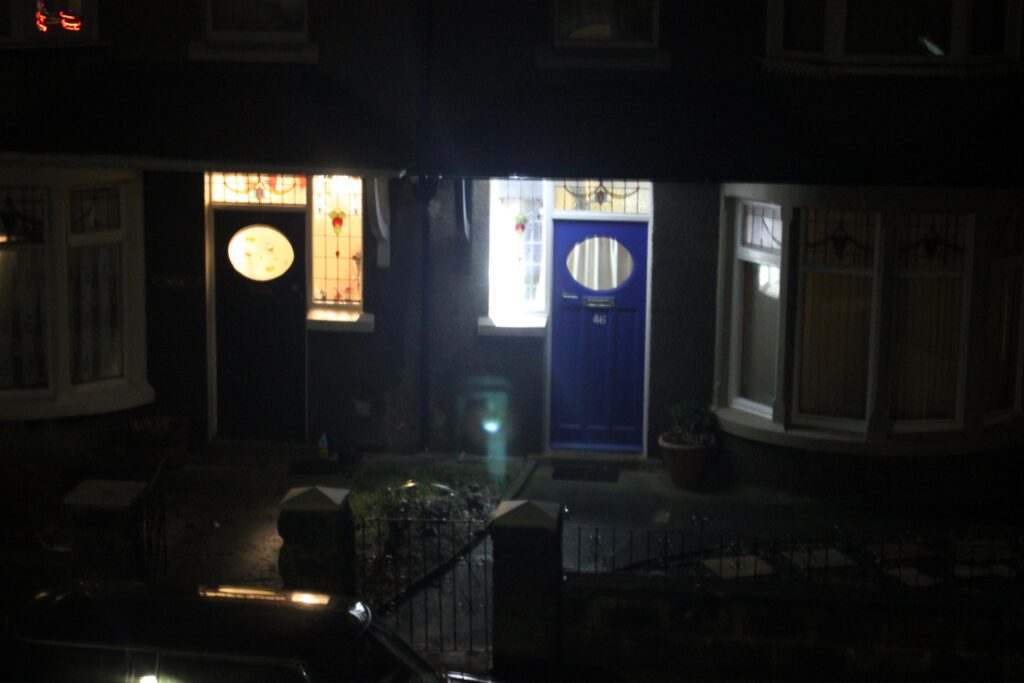
Heysham edge, January 3rd 2022
With my daughter on a cycle to Morecambe and Heysham in July 2020, we also lived in a parallel kingdom, a never-grey world where no precipitation ever fell (not even if it was falling), a world that barely overlapped with any mass-belief ‘reality’, then or now. Only a few sips of wine in the churchyard on Heysham head, were required to take a chaotic late lunch to the enjoyable side of hysterical[vii].
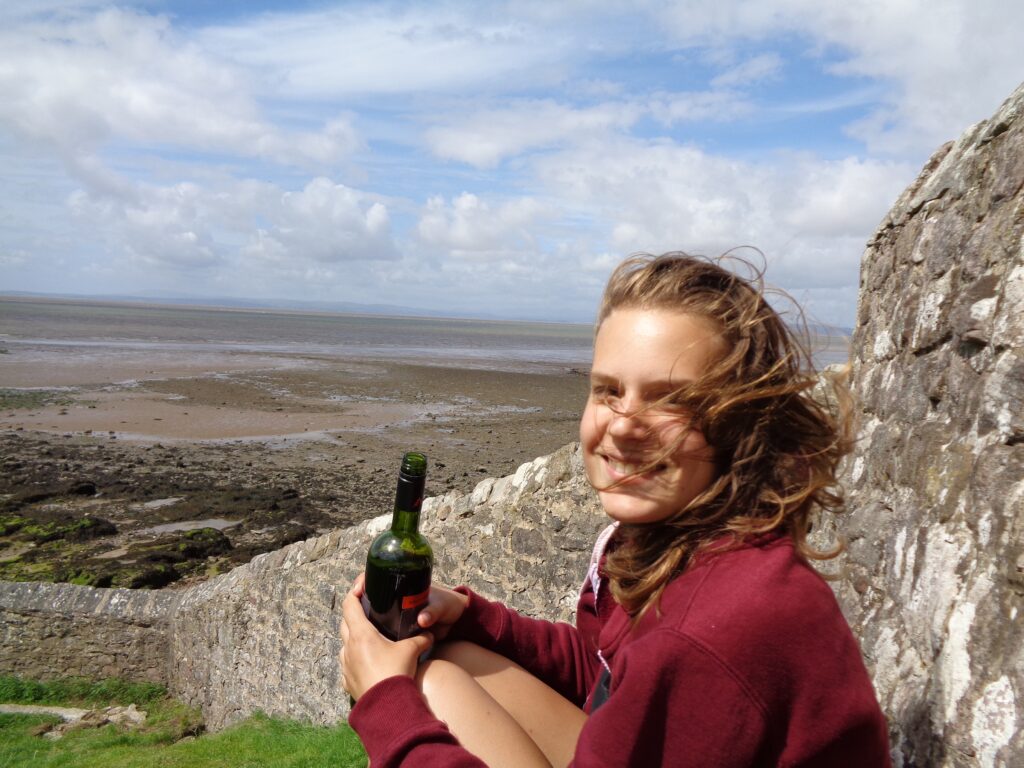
Celeste, St. Peter’s churchyard, Heysham Head, July 2020
So memorable is the atmosphere of certain days that they eclipse most others, and even if you can realise more (at the time) on your own, the joy is unlikely to be present to the same degree. Back in ordinary human life, even that transcendental outreaching which occasionally flows from the solitary, tends to become abstract in retrospect.
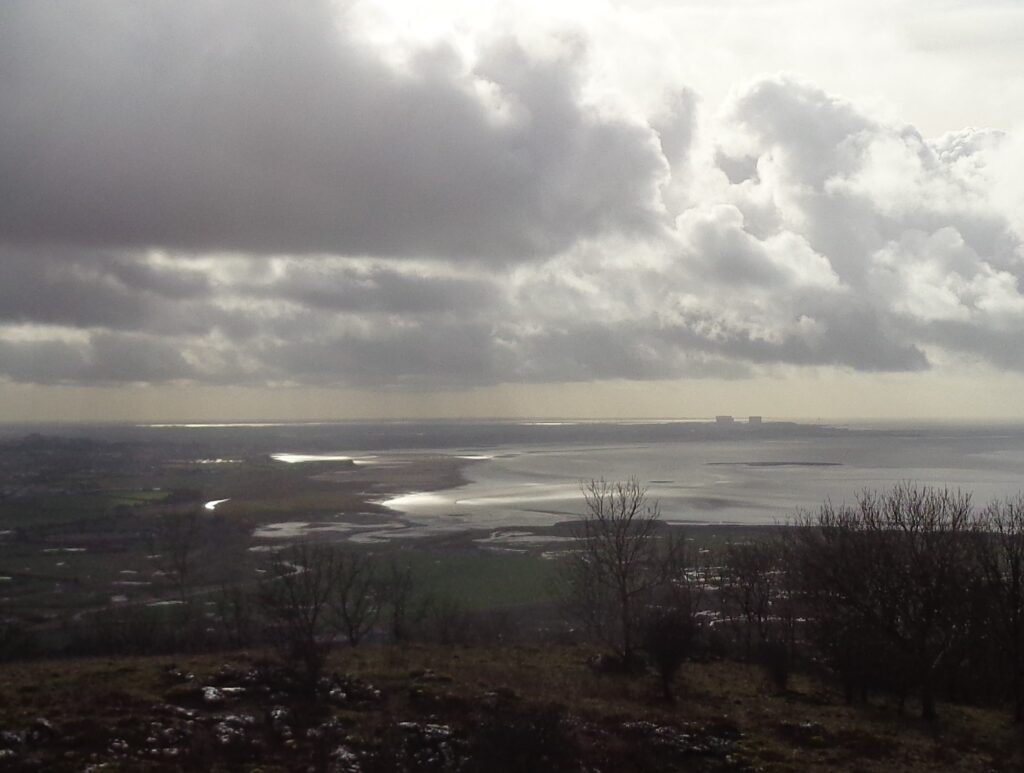
From Warton Crag – the two nuclear power stations[viii] ominous blocks in the distance 11th Feb 2022
Only two of the days through Morecambe and Heysham entangled my daughter, but the trip we shared on 19th July 2020, absorbs all others. It gathers them to itself as if it has become the sun around which they must orbit – underlining one of my incessant refrains: that memory cares nothing for the objective (‘a potentially dangerous attitude I only occasionally dabble with’[ix]) and little for surface truth.
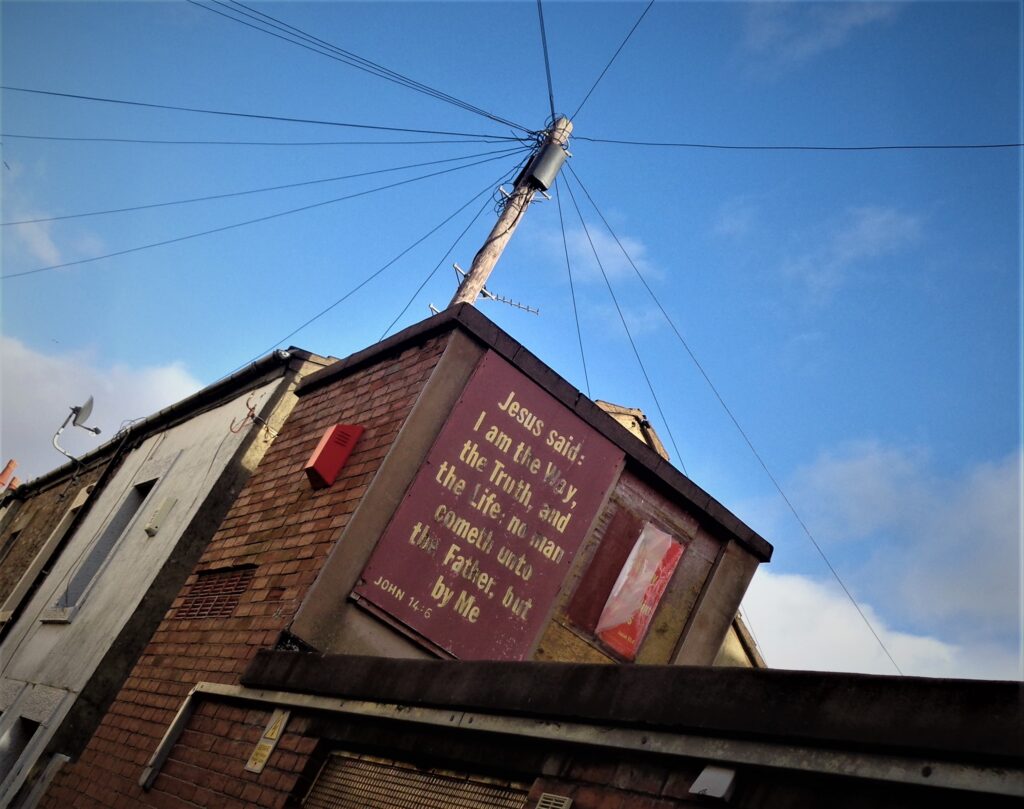
I am the landlines marking the sky . . . Radial wires of the truth exchange, January 2022
But now I’m nailed into the grid, has that old planetary system shifted? Is it light years away? Are there now two kingdoms? A prelapsarian and a disillusioned? Or am I just being weak so far? I grew up in a slum, I ought to be able to revert. In dreams, already I can fly it right – leaving by skylight or high window, I simply don’t bother with the pavement but stay swift and silent above.
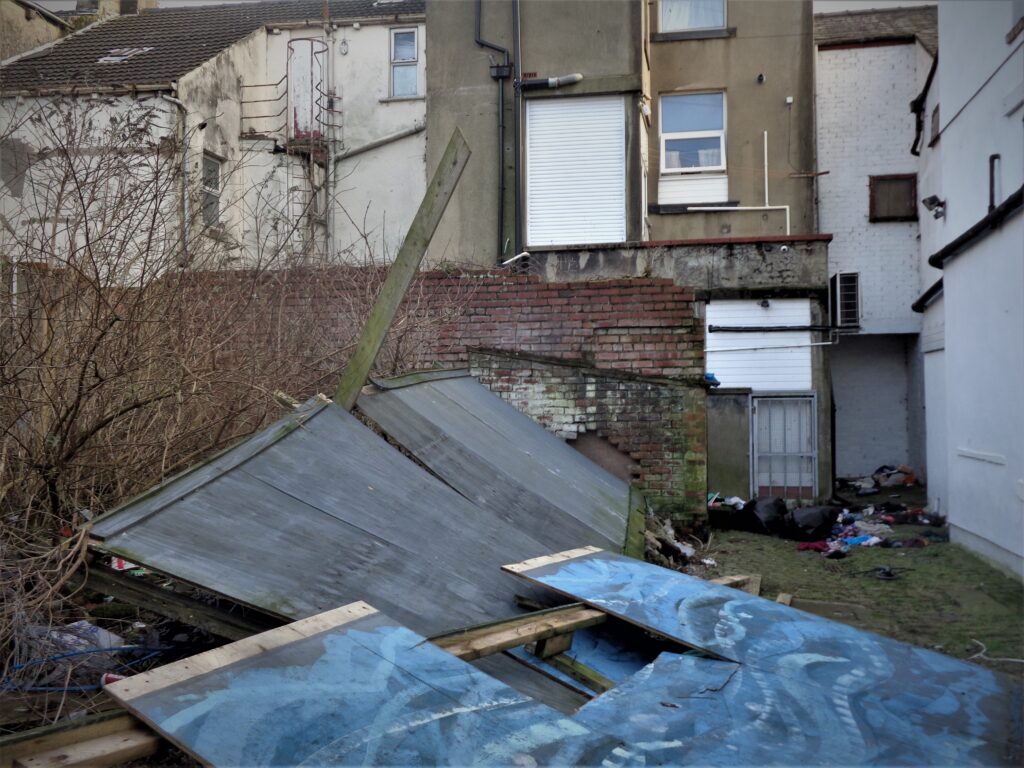
‘So, what do I think I’d find at the lodge? / Expanding mental space certainly / In a galaxy between distant stars / Without a planet to land on . . .’ [x] Morecambe backstreet, 18th January 2022
Back in December 2020, during yet another wave of covid and long before the possibility of being enmeshed in Morecambe and Heysham’s grid had ever entered our heads, K and I inadvertently strayed into its “tier 3” area. Unlike on the other side of the border in Cumbria – where the pubs which hadn’t gone bust, were open – here they were shut and the cafés, takeaway only . . .
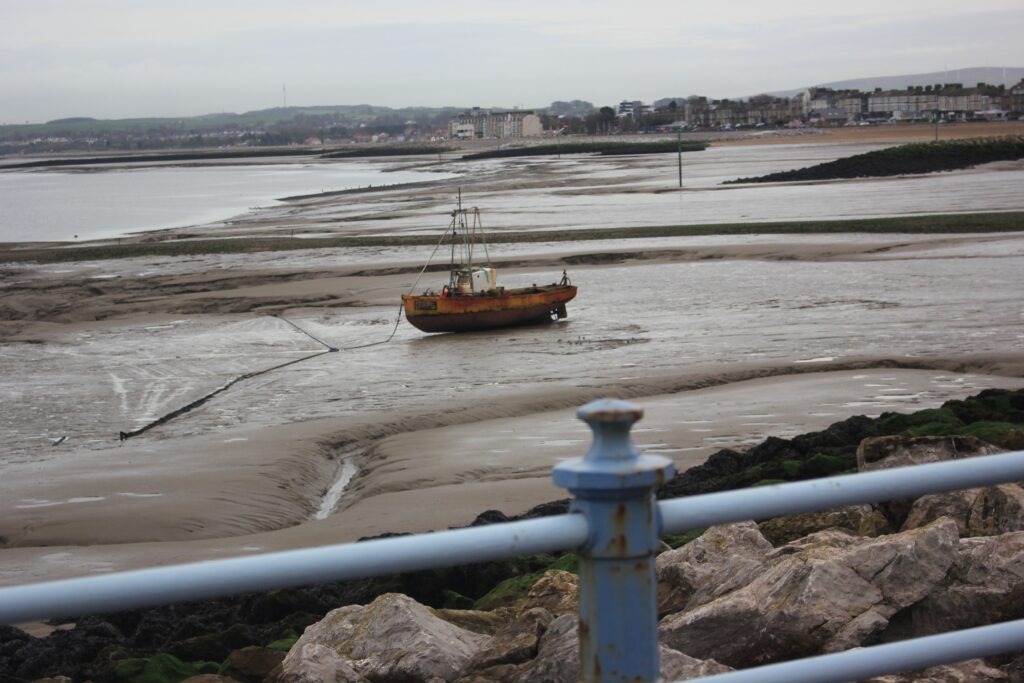
9th December 2020
Typically absurd rules, meant that although several supermarkets had recently been expensively laid out for social distancing (screens, blanked areas, directional arrows on the floor and so on) busy queues were filling the entrances to grasp warm take-away drinks in plastic cups. Throwaway was back with a vengeance. Throngs huddled together before joining the Christmas shoppers packing the shops. Buying cider and rolls we went to sit in grey chilliness on the jetty under one of the numerous ‘no consumption of alcohol’ signs. The fuzz were nowhere to be seen.
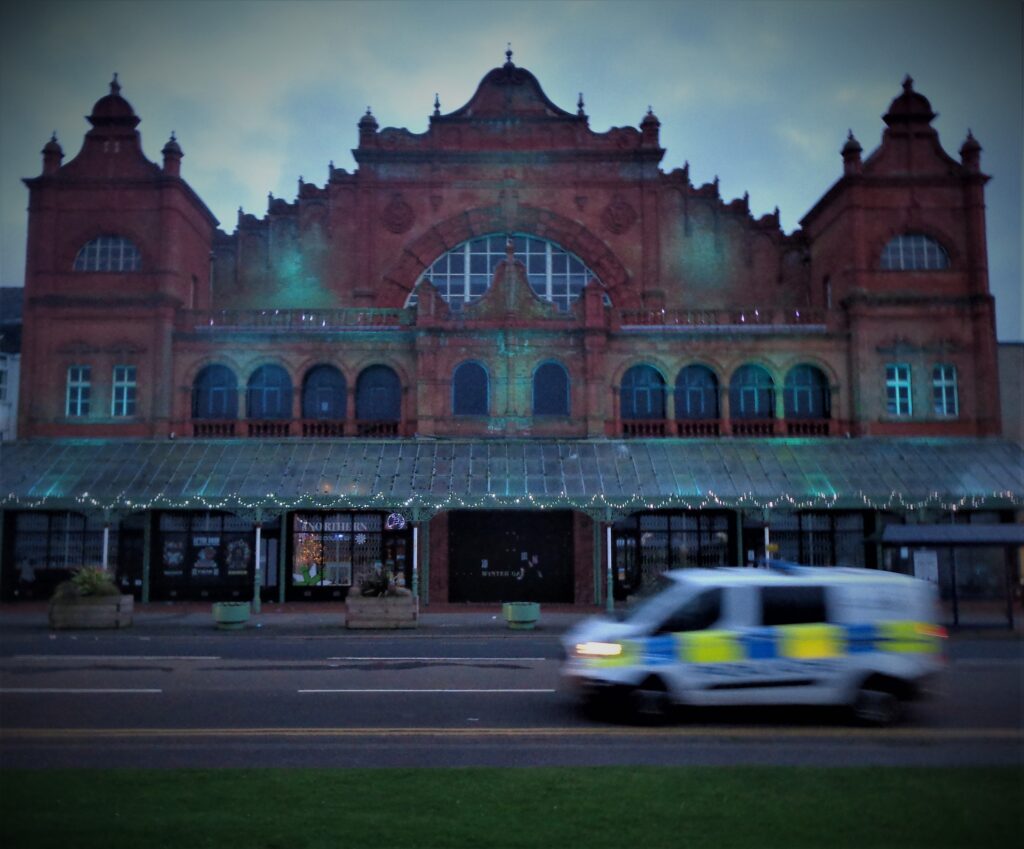
The Fuzz, New Year twilight, Winter Gardens, 3rd Jan, 2022
Various Morecambe rumours drifted across from two sitters on an upwind bench: the so-called “rickets scandal” (later strongly denied by local – albeit conservative – MP “Rickets myth debunked”[xi]) high bike theft statistics and the increasing rates of autism (and other serious health conditions) in the vicinity of Heysham nuclear power stations. This nuclear complex is unbelievably situated given that prevailing winds must blow any leaks straight across the schools, housing estates and heavily populated urban areas adjoining. Gloomy stuff, all these overheard surmises. But other than the stupid fact of nuclear power – which always makes my blood boil – what did we care? We were only here for an hour. Selfishly, we could shrug them off . . .
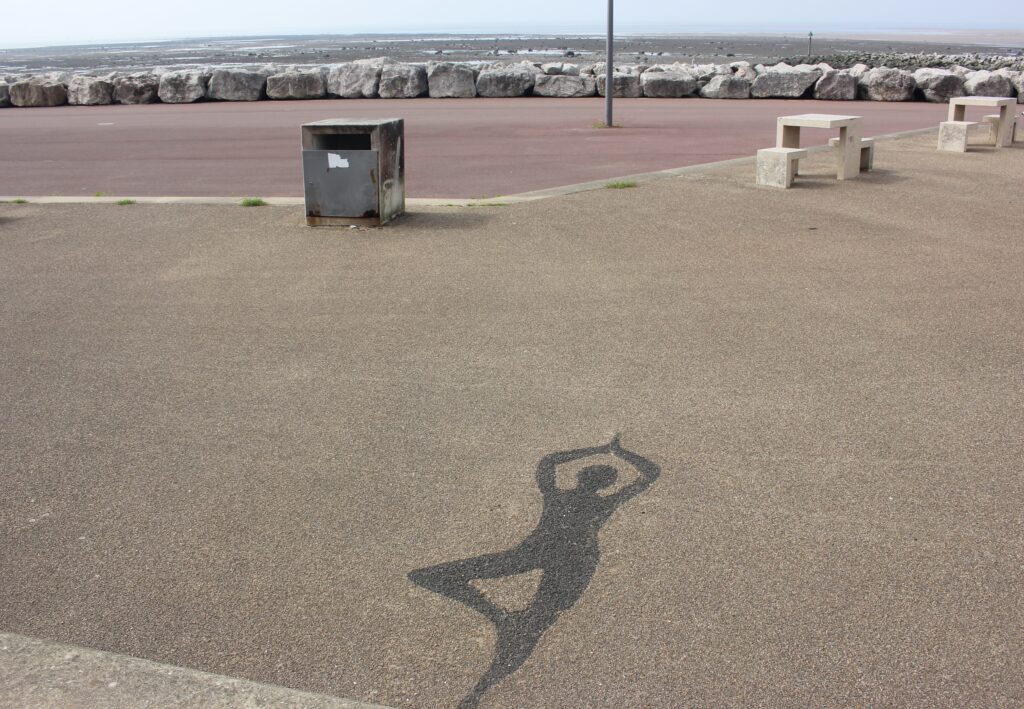
Tai Shiva by the dustbin (Vrikshasana or Tree Pose[xii] perhaps) Aug 2019
As Lucy Muir is captivated by a ghost and the solid-shadow realm it inhabits (whether the ghost is separate and ‘real’ or a proto-feminist projection of Mrs Muir’s, is up to you[xiii]), so I’ve always been embraced by certain places – or at least by the liminal zone between the place as it appears and its history, potential or psychic projection. This obsession (the intimation of there being something hidden behind) has never been whimsical or occurred by choice, and often feels almost supernatural – perhaps to decrease any sense of spiritual or metaphysical loneliness? For in the end, without the magic of love (in whatever form) we would all be as lonely as Lucy Muir. Make no mistake, all ‘normal’ social relationships are only encouragement or compensation – affectionate dogs bouncing off the leash or, more acceptable: thoughtful, purring cats. Friendship may often be love in another form. Some of my best friends are places. Wholly perceived, landscapes and townscapes can become infinitely more than a background, a mirror or the view from a window.
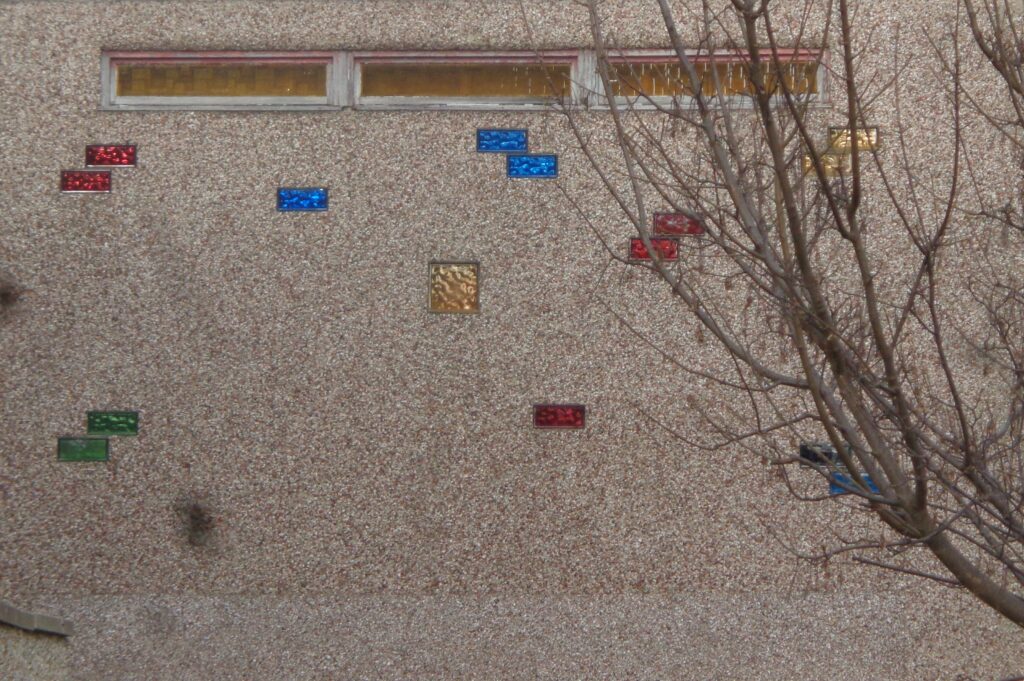
. . . where hope, day and night, become arbitrary flecks of colour, glints of sun, recalled or actual, among ashes of shadow: ‘remember the grail, forget the grail . . .’[xiv] Morecambe, 27th Jan 2022
“Life is black enough without wearing mourning!” observes Martha (Edna Best) just inside a bay window glowing with light refracted and reflected from the ocean. Relieved that her employer and friend Mrs Muir, has reverted to wearing less miserable drapery, she seems happy to live (or exist anyway – are the working class allowed to do more than exist?) in the captain’s welcoming house, despite missing London.
Our house too in its Morecambe/Heysham backstreet is welcoming inside, welcoming in a simple unhaunted way . . . though the sea is not visible even from its chimney pots. It would just be a relief – no matter how architecturally out of place – for the building to shift to a cliff, a mountainside, or a moor.
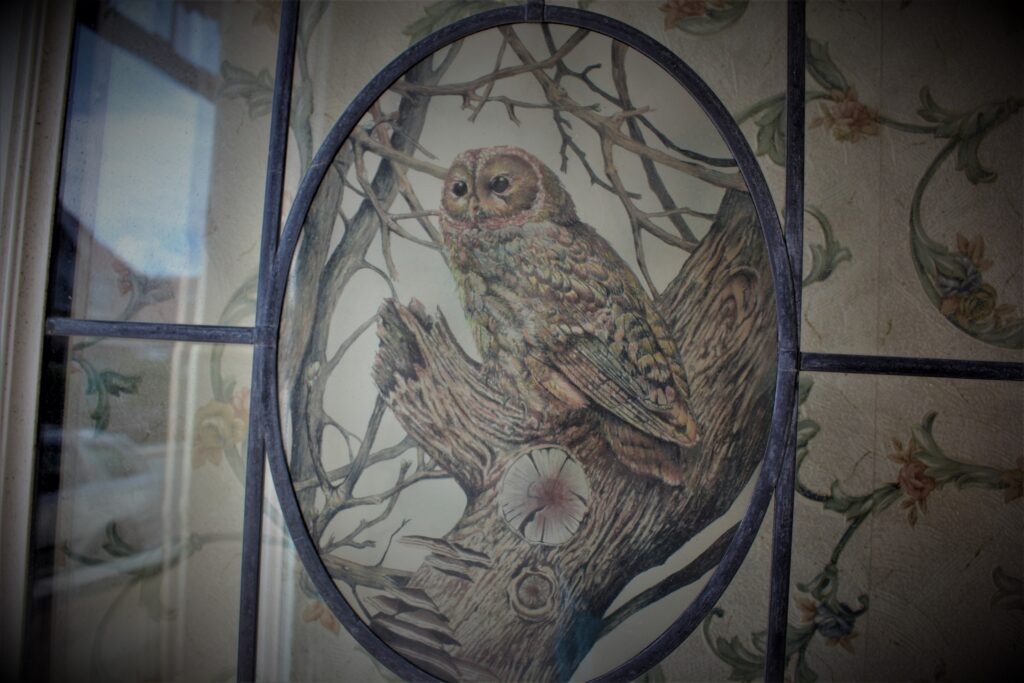
The Owl house, Heysham/Morecambe border, 10th August 2021
Although no querulous presence ever solidified, the ancient cob building we lived in for fourteen years[xv] in North Devon was also haunted, but in a beneficent way – by some abstract genius loci perhaps? No egoistic personality – merely the landscape focussed. As with the owl house on the borders of Morecambe’s West End, and the sea-gazing mansion of voyeuristic Captain Gregg, Little Witheridge always felt happy to welcome us and appeared bereft at our departure[xvi]: ‘The colour is right, the red peeling paint and unfortunate letterbox / The smell, the light of the real / And the wave of happiness . . .’[xvii]
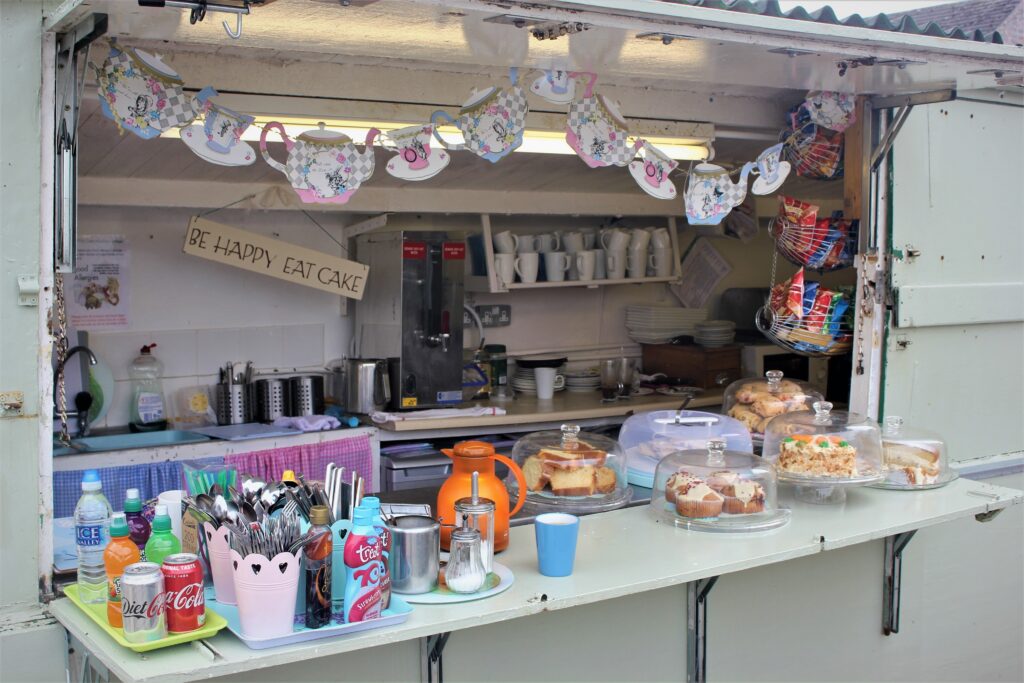
“Be Happy – Eat Cake”, Heysham old village, the Mad Hatter’s Tea Garden 26th Aug 2019
To help in writing about this kingdom by the sea now that I frequently feel beached in some non-future . . . to induce that state of time fusion (past, present, and projected) in which I’ve always tried to live; by day and into the night, I frequently replayed Tim Buckley’s Love from Room 109[xviii] with its background of oceanic wash[xix]. Though much of Love from Room 109 is as anachronistic to Mrs Muir’s Edwardian generation[xx], as it is to Morecambe Bay more than a hundred years later, the voice, lyrics and supporting instruments all weave some kind of unstable bridge or raft. A raft which disregards its precariousness, to sail across an enigmatic ocean worthy of Solaris . . . or through the swirling, unsettling dry ice fog of countless films. From all such artifice, somehow the indefinable need not be distanced. Love from Room 109 repeatedly conjured this indefinable apprehension (or illusion, if you prefer) – as effectively as Bernard Herrmann’s score spellbinds the channels, bays and cliffs of The Ghost and Mrs Muir.
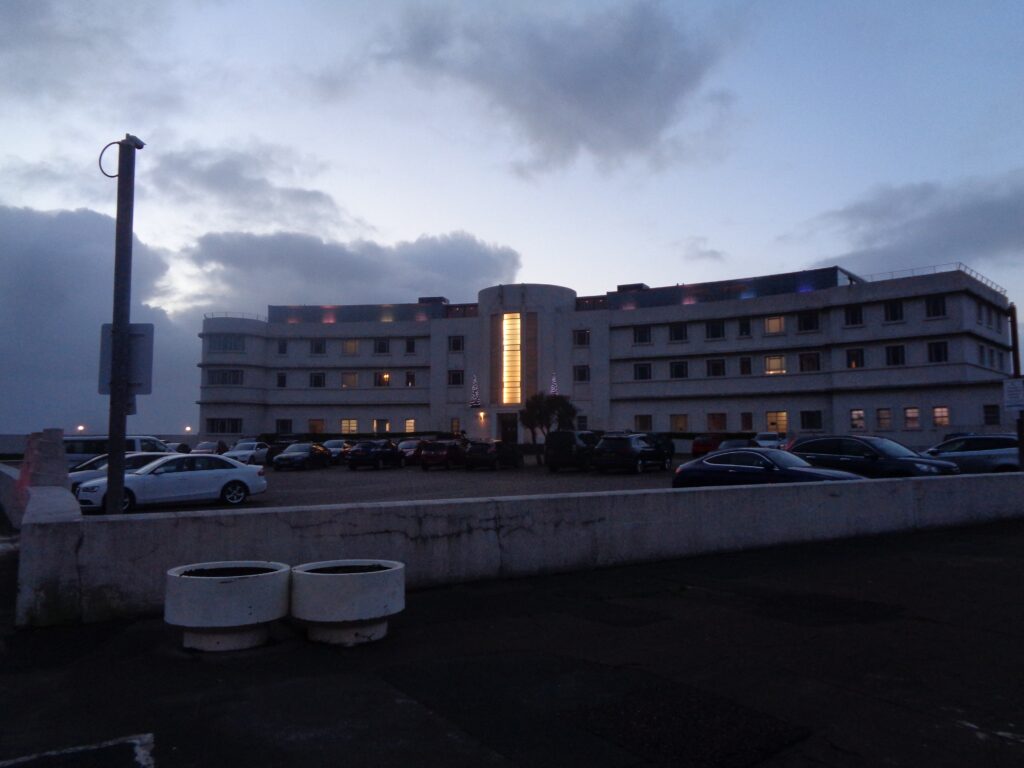
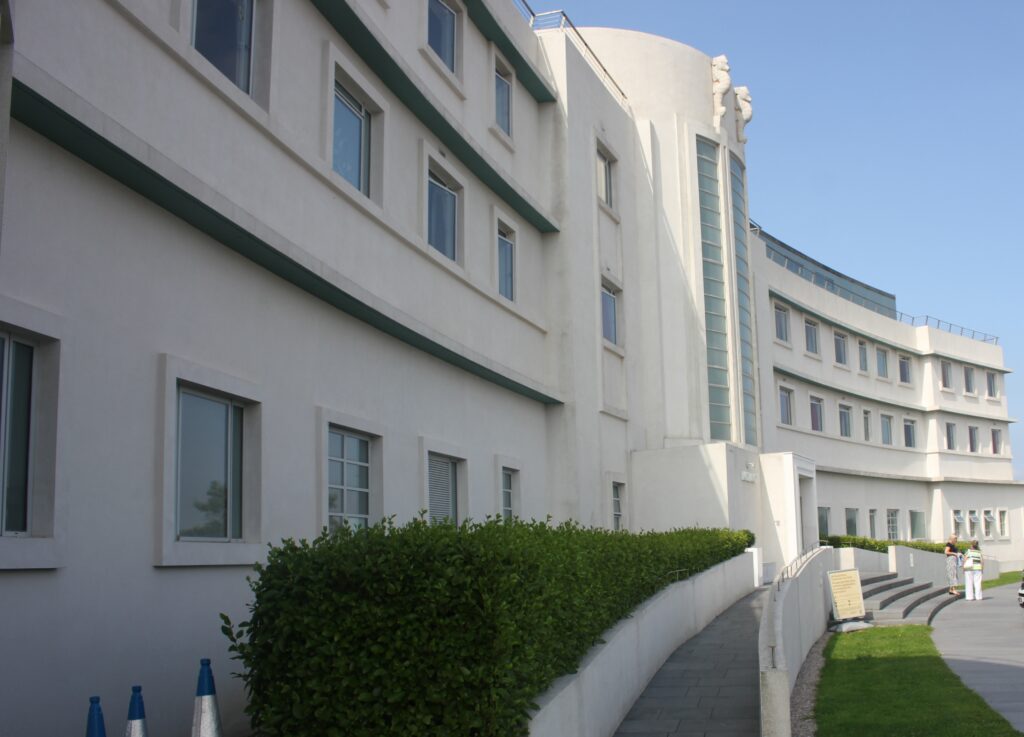
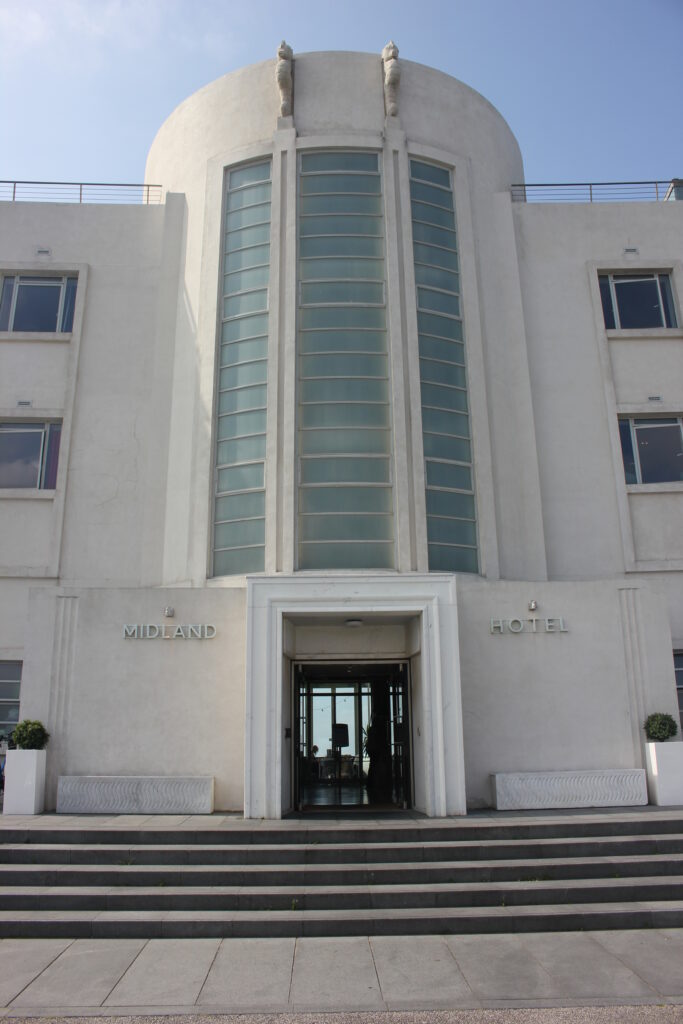
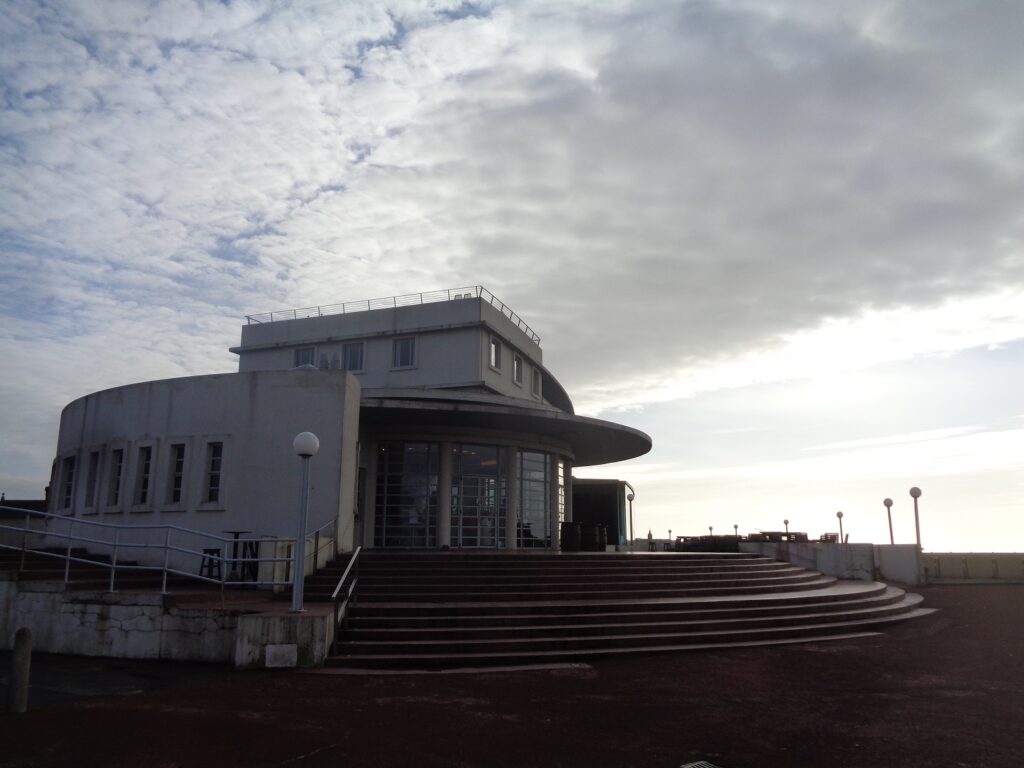
3rd January 2022
Set me frontiers![xxi] As a jarring aside on the Christmas and New Year just gone, is Wham’s Last Christmas[xxii] – anthem to the consumerism[xxiii] of Christmases past – some kind of inverse to Love from Room 109? Having gained an insistent, recurring presence from being laughed at and scorned over the years, does the resulting anthology of friend and familial levity eventually inflict upon the sharers some kind of fatal nostalgia? Suddenly, Wham’s song – now almost 40 years old – synthetic keyboards, synthetic everything: sleigh bells, drum machine, deliberately flat glockenspiel (?) crystallises the absurdities (and yet also the intensities??) of what may have been the last distinctive UK era. Now, it appears to have affectionately become an unspeakable kitsch classic, its imperfections drowned by a wave of memories – on whose confused sea it is washed and buoyed up, George Michael’s ecstatic soaring vocals like some careless mid-ocean S.O.S . . . “Oooh ooo, you gave me away . . .
Next year, someone special
Next year (supernatural whisper) I’ll give it to someone . . .
I’ll give it to someone special
. . . Special . . . .”
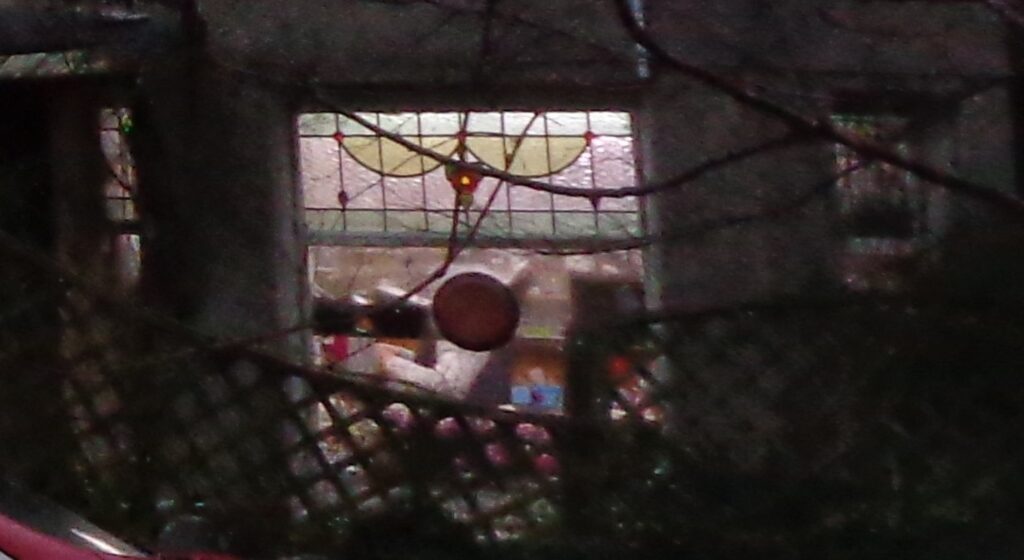
The tail end of last Christmas, Morecambe edge, January 3rd 2022
“But for us . . . it was always Christmas Eve – never the day itself!” she replied, uncontrollable resentment overriding her melancholy.
In time – trapped in time – there was no uplifting answer to this. In time, it was true. All he could say was: “Isn’t that the best part – the anticipation . . .” And torturing all implications, smiling with an acceptance he didn’t feel: “At least we never have to face the bleak January.”[xxiv]

Twilight, Marine Road Central, January 3rd, 2022
Last night, I started reading my second-hand copy of Edmund Glasby’s The Weird Shadow over Morecambe[xxv]:
“For the past eighteen months, the old man had wandered the streets of the increasingly derelict Lancashire coastal town of Morecambe – contender for the unenviable title of ‘The most depressing town in Britain’. None of the Morecambrians knew where he had come from, for none had ever stopped to speak with him, his mysterious background becoming the stuff of local lore. The few who were aware of him speculated that he was a re-housed murderer or paedophile living out his miserable existence in a nondescript squat somewhere along the West End – the great haven for the dole-dossers, junkies and other down and outs.”[xxvi]
It may be true that despite all the boarded houses and warped infrastructure, the West End is now (slowly) on the up, but I can’t help being surprised that despite our exile in this “haven for down and outs”, despite the several months non-stop demolition, rewiring, renovating and ramming our stuff into a terraced house which may forever remain part building site, that I can still summon the disassociation necessary to fantasise about (for example) the exclusive, partially withdrawn houses in Twemlow Parade, less than a mile away, whose French windows back onto the cliffs with their melted stone whispering-knight-guarded gardens. I used to think these unassuming mansions were like the so very English villa at the end of John Buchan’s Edwardian-set, The Thirty-Nine Steps[xxvii]. . . and I can still believe it, with a little effort.
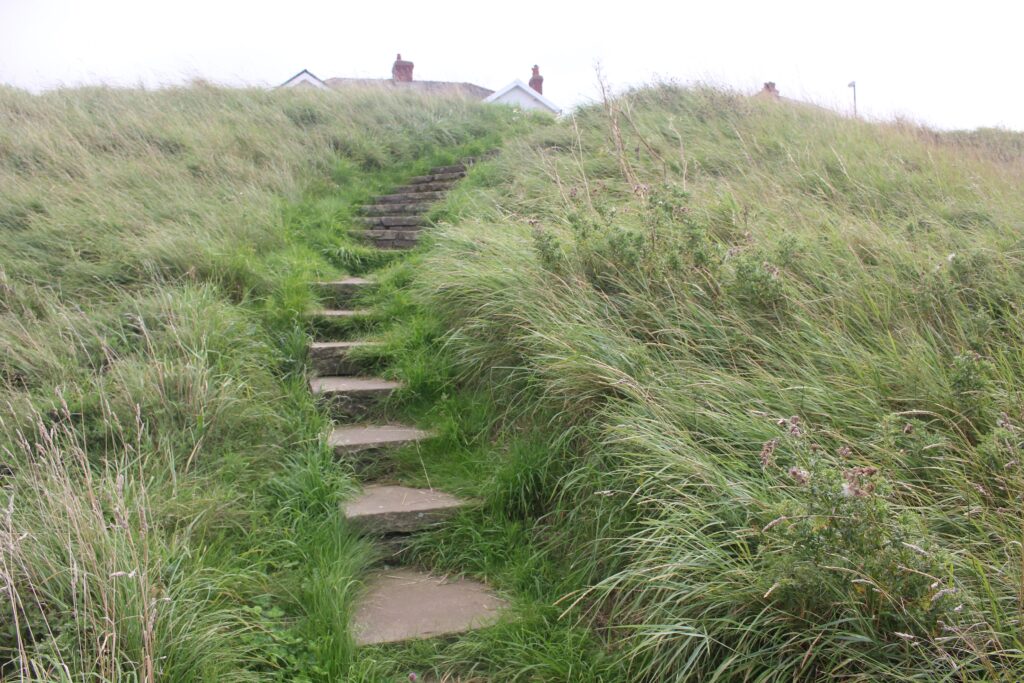
Whinnysty Steps, Aug 2019
There, Hannay’s dangerous foes, master spies concealing surnames like mine, hid superlatively behind plummy voices while thinking of tennis and recalling financial conversations on the 5.20, homeward bound, semi-fast.
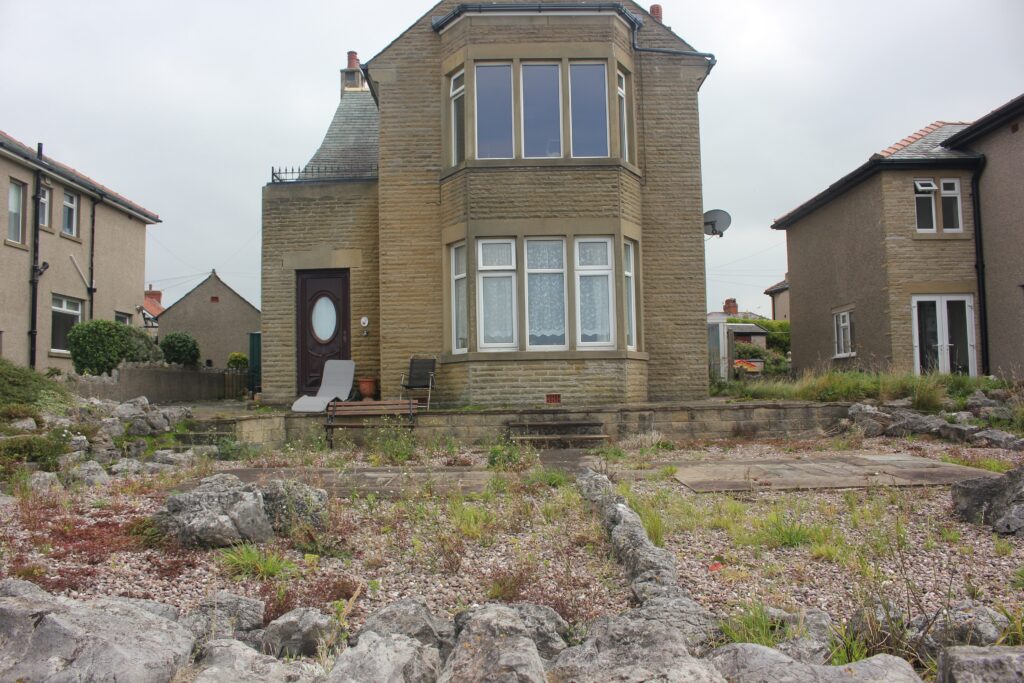
Twemlow Parade, back gardens on the cliffs August 2019
How could I ever have foreseen living a giant’s difficult stone’s throw from here?
Bombed out, 5.30am, November’s night-wandering insomniac:
this place embodies an inner state.
Is there some post-war hope? I doubt it.
The silent streets pass on.[xxviii]
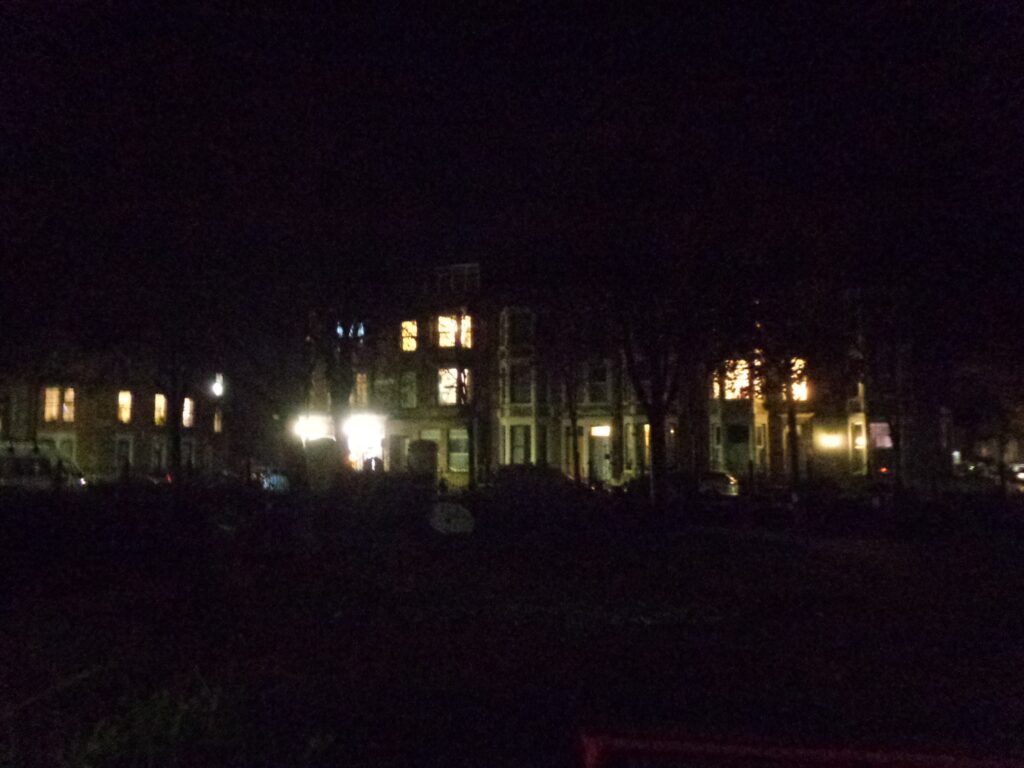
‘echoing vanished cities of the 50s, lodged out of mind . . . impoverished tree-lined squares, autumn swings, bead curtains across crumbling bay windows, glowing, warm, Ban the Bomb . . .’ [xxix] Clarendon Road West, Nov 2021
And yet there have always been these huge contrasts, in cities especially. In the 80s – that distinctive if despicable era – I had a friend who lived in a squat in Albany Street, London NW1. Unrecognisably poshed up now[xxx], at the time, the doors were blocked with rubble, and you had to climb through a window to get to his ‘living room’. Crossing the road and passing between the backs of embassies and other luxurious buildings, found Regent’s Park less than 200 yards west, while 200 yards east lay a council estate with run-down shops, flats, and a high-rise block. And ne’er the twain shall meet[xxxi].
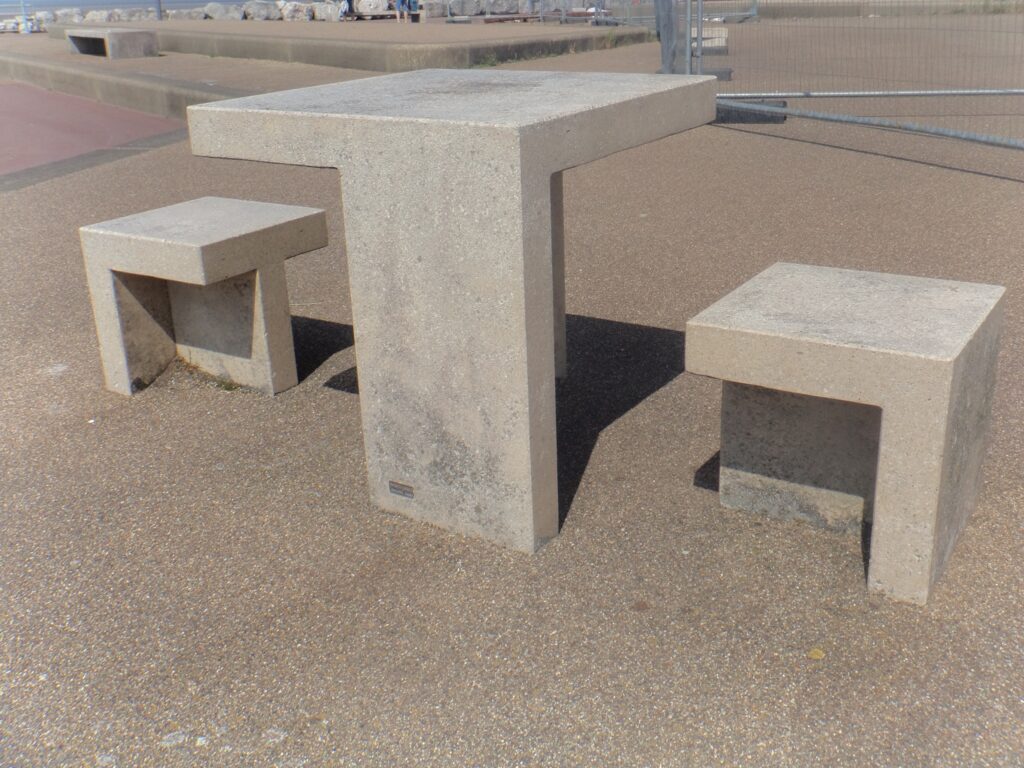
“Angular picnic invitations”[xxxii], Sandylands, May 2018
Overwhelming any personal negativity, offsetting my sense of being bombed out[xxxiii] are those writers and film enthusiasts who meet in West Street, less than five minutes’ walk away. Glasby’s protagonist in The Weird Shadow over Morecambe[xxxiv] has been particularly unlucky it seems, for no Morecambrians – born and bred, recent residents or refugees – ever to have bothered to speak to him. I’m engaged in friendly talk at length every time I leave the house, often by people whose stories behind the scenes are far harsher than ours. Legions of ghosts and pre-ghosts, down to earth opaque citizens, nauticals, landlubbers, cynical, hopeful, once loved dreamers or outcasts, haunt the alleys, streets, bars and charity shops, all likely caught in their own floating eras. I’m exaggerating, but not much[xxxv].

AEC REGENT III, LTF 254 at Heysham village, May 2018
Back in 2019, I walked past the veranda of a house adjoining the promenade in Sandylands to find myself cheered by the sight of an old sea captain enjoying a pipe. It’s about time a pipe preservation society[xxxvi] was founded. Back in the 50s and 60s not one self-respecting Ladybird book[xxxvii]dad (for example) would ever have embraced the light of day without a trusty briar. Nowadays one rarely sights pipes of any sort or catches the scent of Mac Baren: Mixture Scottish Blend or Lane Limited 1-Q[xxxviii] to summon two, aromatic tobacco blends.
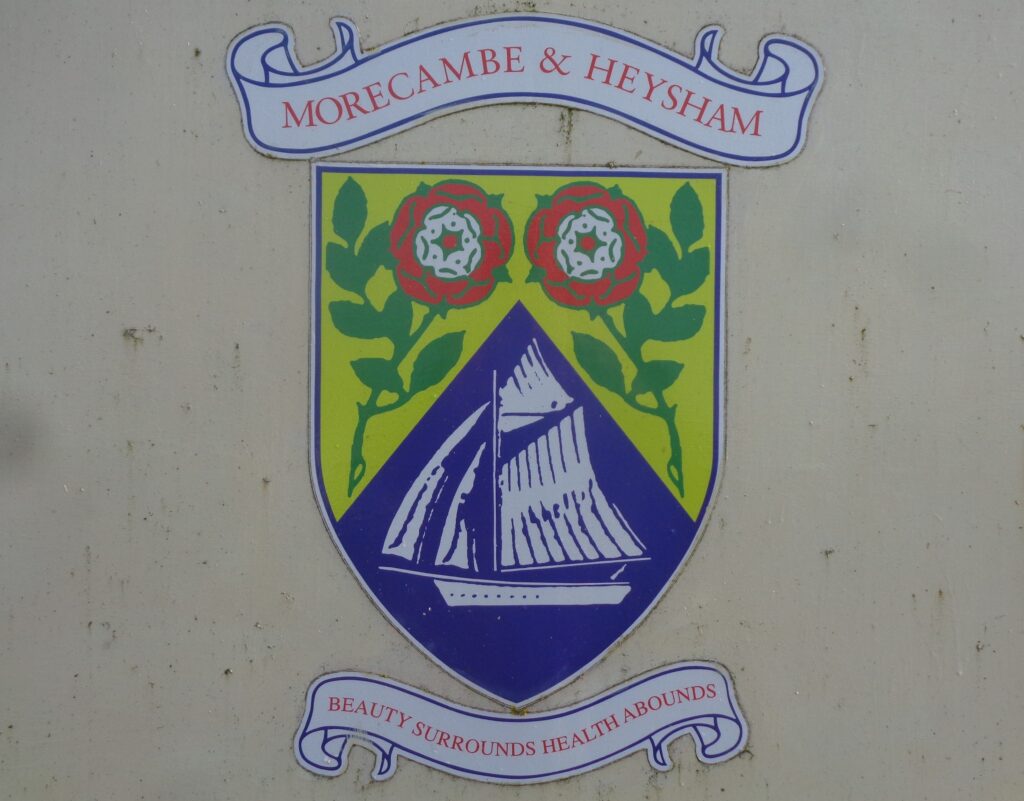
Morecambe & Heysham may be fascinating or even inspiring – but beautiful and healthy! Unfortunately, as a final death knell, the local Conservative club have also appropriated the symbol.
In fairness, not even a resigned, aged version of Rex Harrison – a Captain Gregg without a trace of arrogant impatience – would have resembled 2019’s pipe-smoking seaman of Sandylands. But once observed, this character has lodged in my mind. Something about him was essential. He personified that mythic idea: the storm-tossed voyager now withdrawing from the world in a different way. Becalmed flotsam, run aground from the classic film . . . or from that life we all manage to live by ignoring its triviality. A year later as Celeste and I cycled past the approximate area of my initial sighting, I was rambling on about this previous encounter. On our outward journey, the sea frontages of the houses were in shade and my daughter probably assumed I was inventing the man. Figment or not, there was no chance he’d turn up again. I’d been kicking myself for a year that I hadn’t had the nerve in 2019, to ask if I could photograph him. Yet on the way back, verandas now in the sun, there he was: just stepping out onto the balcony with his pipe!
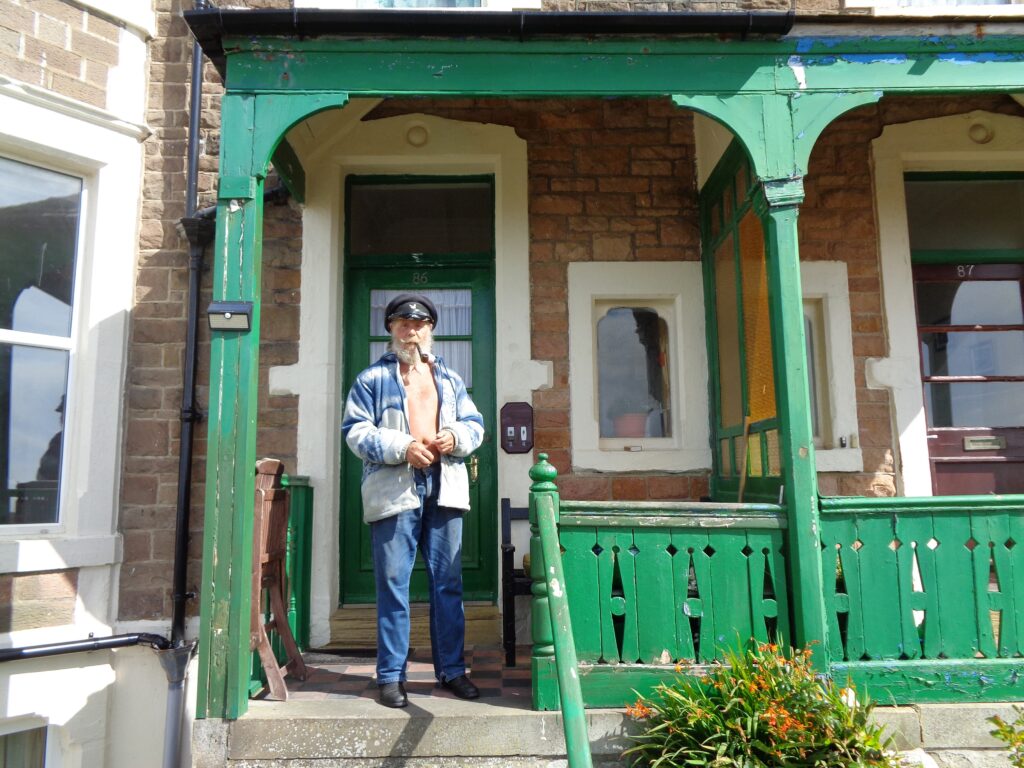
Retired sea captain, July 2020
‘Near here must live the old sea captain we once met in summer daylight, calmly settled on his old veranda, likely rented, probably resting on tolerance. Whether he’d ever been to sea was hard to tell, but he had the pipe and the crested cap and was keen – doing up his shirt – to be recorded. Was that his image? Was that how he survived?’ [xxxix]
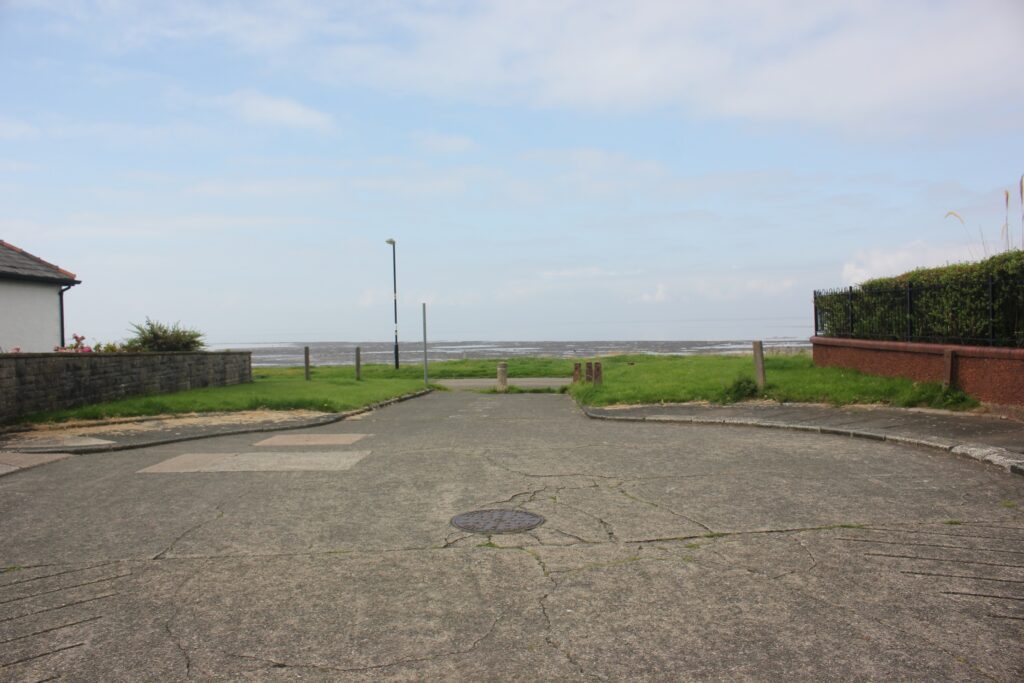
A prospect of the sea, from Ferncliffe Drive, Aug 2019
If, as Nietzsche implies in The Birth of Tragedy (1870-1) and later clarified in his An Attempt at Self-Criticism[xl] (1886) that only art – not morality – justifies the existence of the world, then the definition of art becomes crucial. Obviously much of what might be considered art nowadays (any days?) is completely irrelevant and of infinitely less value than the consideration of morality. Meanwhile, even some of the most valuable art, often inescapably embodies aspects of morality, positive or negative. Both Tarkovsky’s and Soderbergh’s Solaris (1972 and 2002[xli] respectively) are predominantly about morality – taking positions from which the original novel refrains[xlii]. I’m not sure whether The Ghost and Mrs Muir is (inadvertently[xliii]) great art – but it is certainly a film which by cynical modern standards relies on empathy or a sinking-in, to reveal its more crucial nature. As Grafe[xliv] notes on page 44 of her study: “In Zanuck’s primarily realistic film, this spirit incarnate goes as far as Hollywood could allow in suggesting that film depends on an act of faith on the part of the audience.”
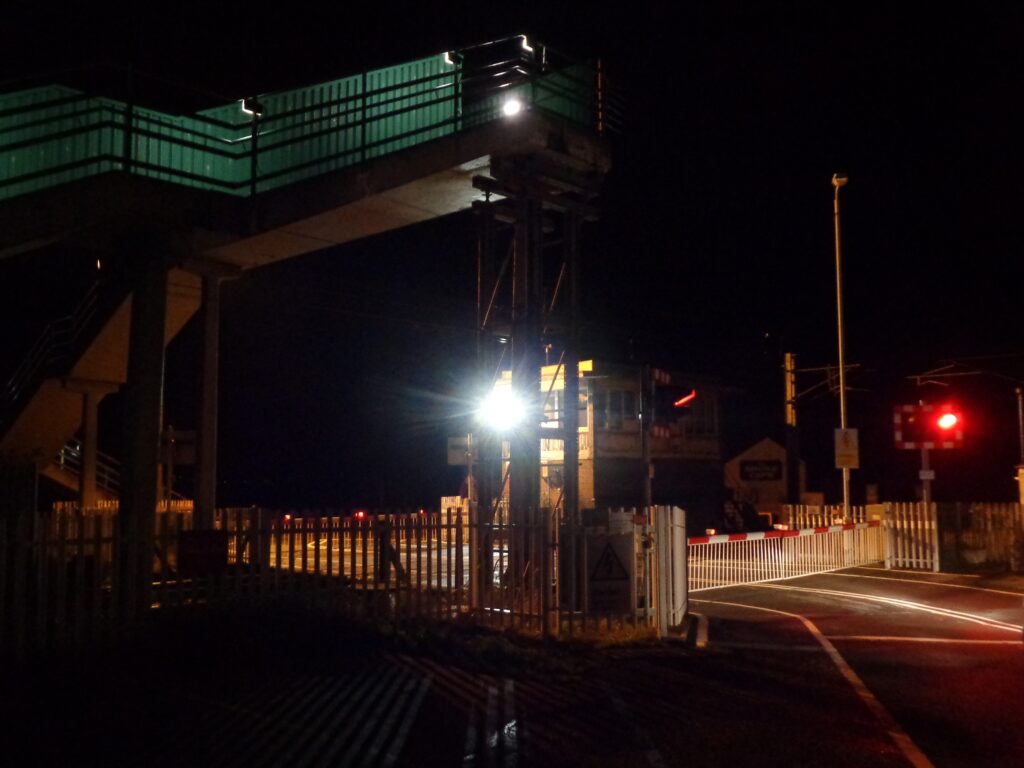
Hest Bank level crossing, the sea invisible in the night beyond, 29th October 2021
As for The Ghost and Mrs Muir (1947), in moods as varying as joy and melancholy, I could easily go back again to the beginning. Back to Lucy’s escape from the swiftly sketched backdrop of smoking London. As soon as the strains of Bernard Herrmann’s music open over cliffs and ocean, the spine reacts, and a nebulous memory of the story’s atmosphere – as though it could always be different – blooms back to life. It’s easy, almost instantly, to feel an intensification as well as an evasion of time. The archetypal nature of the maritime setting can carry across to the North Devon’s Atlantic coast, the English Channel in Dorset or even the radioactive swirling of the Irish Sea[xlv] into Morecambe Bay. The sea and the music link them all.
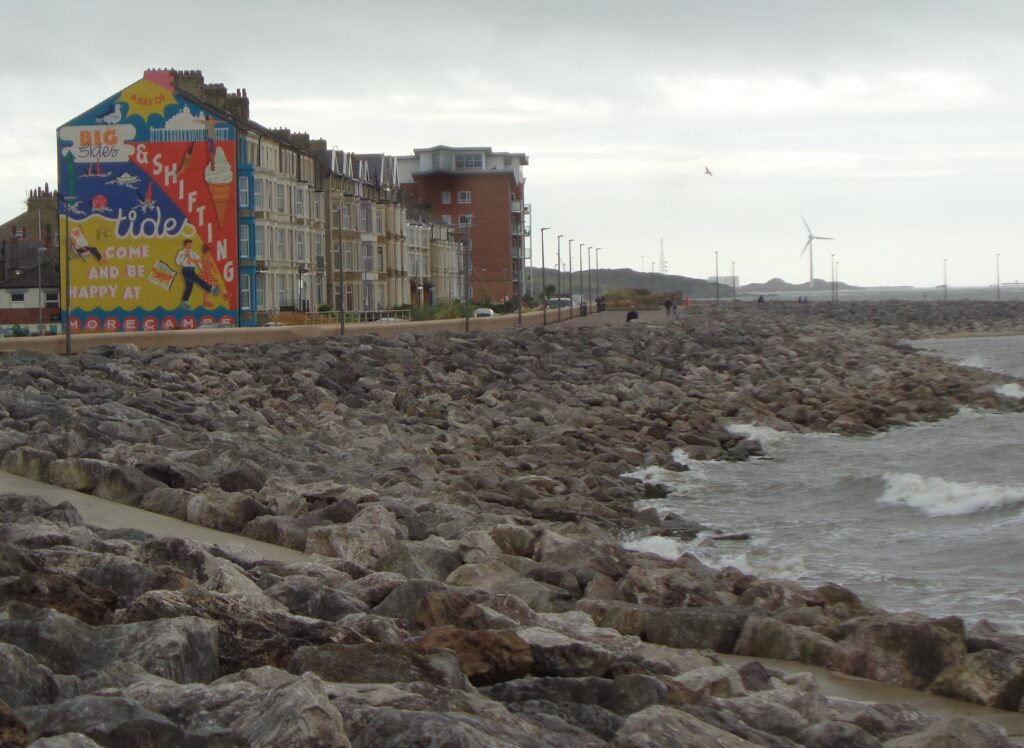
The fairly new[xlvi] ‘Come & Be Happy at Morecambe’ mural, High Tide, 24th September 2021
Humour – including the perfumed parlour snake played to perfection by George Sanders – flows in crosscurrents above The Ghost and Mrs Muir’s undertow of caustic melancholy. The film is so much more than the sum of its parts. If (my wife or partner) K considers it “sentimental tosh” it’s only because of her unwillingness to be carried away. In fact, The Ghost and Mrs Muir has barely an ounce of sentimentality in its entire running length. There is a small dog, but it’s barely indulged. There is a child – Anna (portrayed by Natalie Wood) – but she’s little more than a side-line to indicate the passage of the years. Captivated by an old sailor/seaman/beachcomber (nowadays the poor old geezer would be suspected or locked up) arguably, Anna spends more time with Mr Scroggins (!) than with her mother. Once her name is carved by Scroggins into a solid post at the head of one of the beach groynes, this wooden column symbolically ousts her from the film for at least a decade – until she briefly returns near the end (now played by Vanessa Brown), a kind, yet upwardly mobile young woman, with a toff in the offing.
Before long, the decaying post ousts her again . . . as it subsides into the crashing surf.

The Odeon from Lancaster Road railway bridge, languishing as a DIY outlet, February 9th, 2022
Since the still magnificent Odeon[xlvii] at the eastern end of Euston Road in Morecambe opened in September 1937, almost ten years before the release of The Ghost and Mrs Muir, it’s interesting to wonder whether the Hollywood film ever screened here in the late 40s. I’ve tried, though not slavishly, to answer this. But perhaps films produced by 20th Century Fox would have been affiliated to a different cinema chain? However, not long after Odeon founder, Oscar Deutsch’s death in December 1941, Odeon and Gaumont merged[xlviii]. This must increase the chance that Mrs Muir’s reunion with Captain Gregg was witnessed all those years ago by a smoke-filled auditorium packed with both visitors and Morecambrians. Illuminated by the flickering beams from the projection room they would have watched the lovers pass through the doors onto the cliffs towards some higher life where Lucy would “never be tired again.”[xlix]
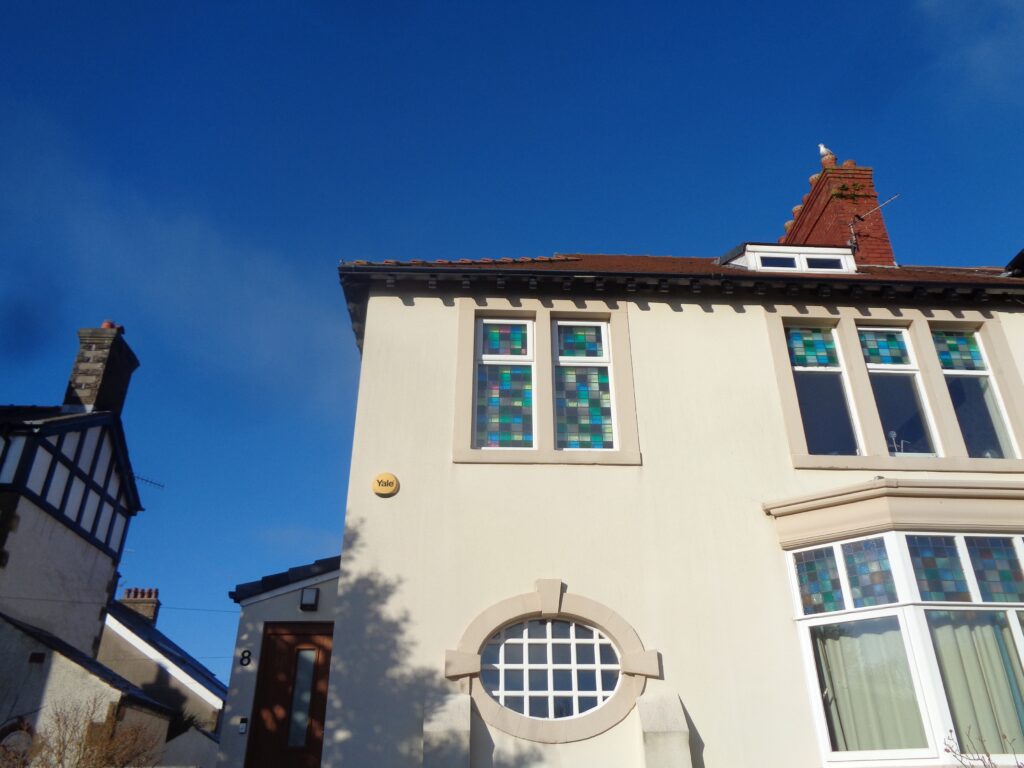
The calm after the storm, Furness Road, Heysham, 19th February 2022
[Morecambe and Heysham, 19th of February 2022]: Storms have been breaking over the promenade for the past two days and gale-force gusts threatening to rip roof tiles away. Then came snow – or rather grey-gloom slush. But by midday yesterday a blazing sun made walking south into the light almost blindingly impossible. With my cheap camera’s screen now entirely gone and no viewfinder, it’s impossible to say what lucky dip shots might emerge – but the blueness above is entirely unfaked. What certainty that blueness contains! Unforced. Against destruction. Calmly messianic!
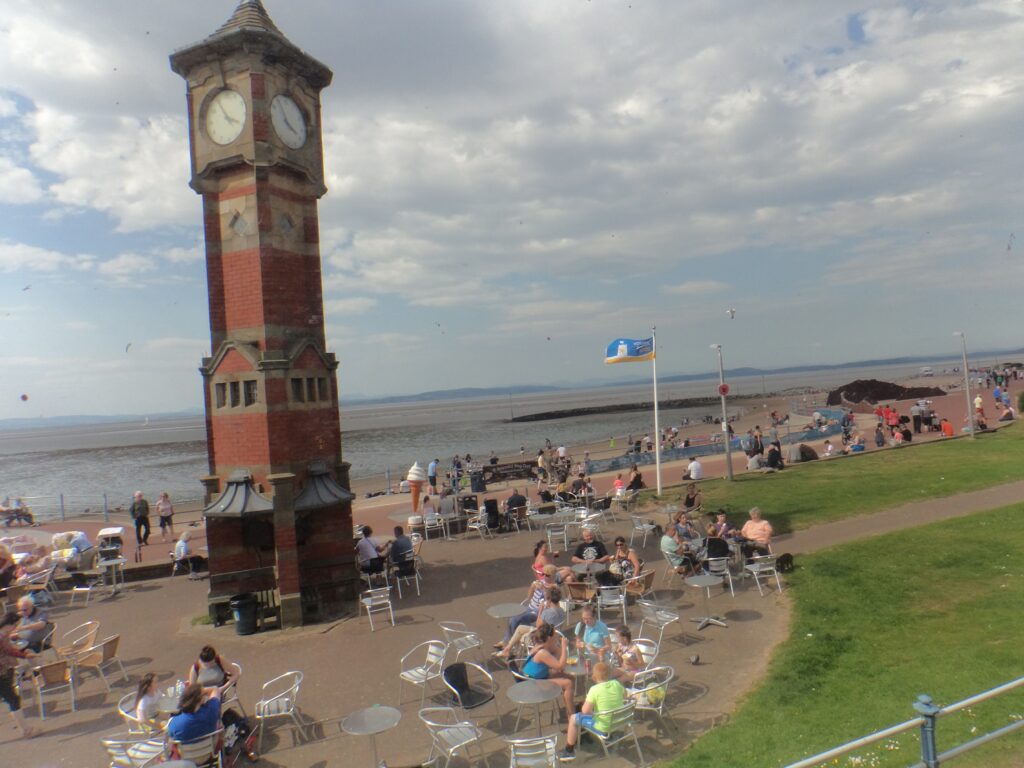
Homeward bound by 50s double decker, 27th May 2018
Certainty in a vague, numinous or mystical sense – if such a paradox makes any sense in human terms, (some might say I mean faith, but that sounds too meek) – strikes me as a grand quality, one always worth pursuing. Certainty in the human world, by contrast, whether as preached by religious fundamentalists, technology lovers or overzealous atheists, illustrates only different forms of pride or bluster against fear.
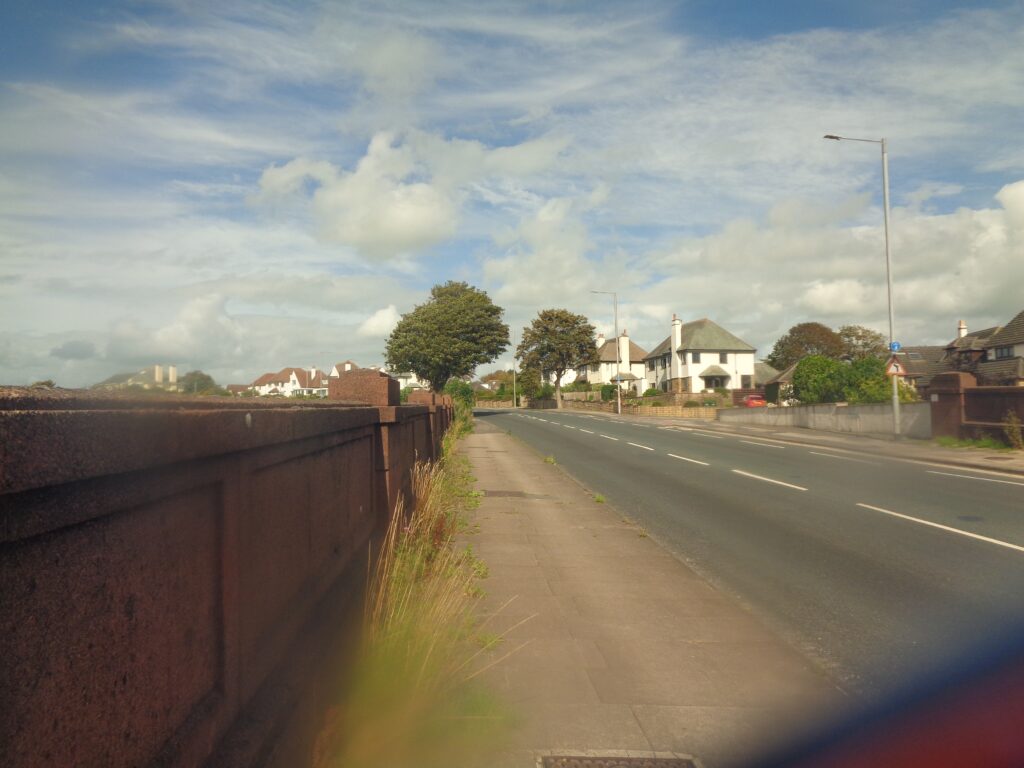
Hest Bank, homeward bound by bicycle, July 2020
The trouble is, I can’t say how to access this looser form of certainty. It must be different for everyone. I can only say how surprised I was, to encounter its traces so richly from the largely suburban seaside kingdom of Morecambe and Heysham. Whether the quality will decline now that I live here and am not always arriving or homeward bound, I’m not sure.
End of Part Two.
© Lawrence Freiesleben
Cumbria and Morecambe, May 2018 – March 2022
NOTES All notes accessed between Jan 19th and March 23rd 2022
[i] From Then is Now, January 2022
[ii] See also the first part of In Her Kingdom by the Sea : https://internationaltimes.it/in-her-kingdom-by-the-sea-visionary-seaside-suburbia-part-1/
[iii] From an email of November 2021: “Wandering around while the children were at their music club, (£1 each – heavily subsidised to get kids off the streets . . . but does it generally attract only the lower middle and aspiring working classes?) I got harangued last night by three kids/teenagers on the prom. Bizarre experience – they were obviously more scared of me than I was of them and trying to psyche themselves up to ‘do something’ (“But I can’t, cos he keeps turning round”). I wondered if it was another phone/social media trend where they harass adults into beating them up while secretly filming it to sue for compensation? Finally went into B & M’s and bought four cake bars. Youth work training from the 80s and 90s fighting back, I was going to try questioning their reasons. Predictably, they’d disappeared. Wandered around looking for them but no luck. It certainly makes you realise that we are in the middle rather than at the bottom end of the spectrum in terms of deprivation.
Perhaps I need to delete this optimistic verse from No Error, or add something about peer pressure, given the way this mini gang were egging on/torturing each other?
Does every boy and girl at about fifteen –
or at least those not absorbed or blighted by technology or society
(a fate ever harder to avoid)
radiate that treasure house of potential?
Unrealised jewels in the moving of wishes.
[iv] Ibid., Then is Now. Increasingly the societal world has become unreal to me. Hardly surprising, when at almost every level it has no positive future. Looking back, I’m not sure anything has changed. I always felt like this. Even as a five-year-old, the complacent goals of human ambition were totally unconvincing. It’s merely that being in the grid brings futility into focus – as was the case years ago, living in towns and stuck in school. Once I left home and moved into the country, in rural environments, our universal sickness was easier to overlook.
[v] https://en.wikipedia.org/wiki/Mustang
[vi] The production designer 1947’s film must’ve had a strange idea of ‘cottage’. Gull Grange would be more accurate regarding Lucy Muir’s new house.
[vii] Churchyards have always been a favourite place and I never think it disrespectful to eat or drink in them. Quite the contrary. Either the places are in some way occupied, in which case I feel they’ll enjoy the company, or they’re not, in which case you’re left with nature – sometimes a rare and valuable green space in town or city. Even in the country, they give a peaceful place to sit where no rich twit is ever going to come along and say “we think of this” (empty mown hay field, nothing to damage, for example) “as though it were part of my garden!” To which the reply usually runs: “How lucky to have so many to choose from. So bugger off to a different one, dear chap.”
[viii] From https://internationaltimes.it/bomb-damage-maps-a-west-london-digression/ “A short film I saw a few nights back: Atomic Achievement[i] from 1956, was beautiful to look at, yet painful or laughable to watch. To remember that poisonous naivety and our misplaced hopes. Viewing this film about atomic scientists and their irradiated minions, is like watching toddlers play with broken glass.” That some can consider nuclear a ‘green’ alternative is beyond belief.
[ix] https://internationaltimes.it/home-is-where-christmas-is/ in which I first raised the idea-in-waiting of a Morecambe and Heysham digression to overlap with The Ghost & Mrs Muir
[xi] https://www.davidmorris.org.uk/news/update-rickets-myth-debunked Being an organ of the Conservatives gives this denial, complete with grinning puppet photo, a very dubious provenance.
[xii] https://www.stylecraze.com/articles/the-tree-pose-how-to-do-and-what-are-its-benefits/
[xiii] To my mind, Lucy Muir is a strong enough character in herself, not to need any props.
[xiv] Ibid., Bombed Out (in Morecambe), November 2021
[xv] By far the longest period we ever lived in the same house.
[xvi] One of the key starting points of Maze End (2013)
[xviii] https://www.youtube.com/watch?v=fOeKz6JCKaw
[xix] A supposed fact from the internet: “A little-known story about this song according to producer Jerry Yester is that the “oceanic” effects weren’t supposed to be on this track, but the engineer Bruce Botnick forgot to turn on a noise reduction switch which layered the song with a “hum”. So the only way to salvage the take was to add the waves recorded from Tim’s home on the beach.”
[xx] Freda Grafe (on page 32) asks why the characters in neither the novel nor the film mention the First World War, but rather than this being proof that the film runs on “asocial internal time”, the simple reason is, that it hasn’t happened yet! Given that Grafe describes Mrs Muir’s fashions as “respectably Victorian” (page 49), it’s strange for her to make such an obvious mistake. Another indicator of period is the bathing machine on the beach. These were popular from the 18th Century and declined rapidly from 1901. Most bathing machines had disappeared by 1914. See: https://en.wikipedia.org/wiki/Bathing_machine
Personally, I’ve always seen the film’s setting as Edwardian (1901-1910). In the film, Lucy Muir mentions that we’re in the “20th century”, as if it’s only just begun . . .
[xxi] I’m very disappointed to discover that the oddly intriguing lyric “This year, to set me frontiers,” which I thought was the (oft repeated) third, intelligible line of Wham’s – unbelievably sickly on the page – Last Christmas is actually: “This year, to save me from tears”! I feel like withdrawing my appreciation, no matter how peripheral it was . . . But as the discovery damages my mind more than my nostalgia, I’ll forgive Wham. Rest in peace, George.
[xxii] https://en.wikipedia.org/wiki/Last_Christmas
[xxiii] A consumerism only emphasised in the ‘Official Video’, albeit tempered by a festive sense of community: https://www.youtube.com/watch?v=E8gmARGvPlI&ab_channel=WhamVEVO All that magnificent, tinted hair in bog-brush arrangements.
[xxiv] From: Maze End, chapter 36, Asia le Bower
[xxv] Linford Mystery Library ISBN 978-1-4448-2229-8 page 1. See the first part of this digression:
https://internationaltimes.it/in-her-kingdom-by-the-sea-visionary-seaside-suburbia-part-1/
[xxvi] From an email of 5th March: “I’ve become frequently insomniac again – so lots of extra reading. The Weird Shadow over Morecambe tilts between a dead depressed noting of the place, comic interludes and grisly absurdity – headless killer (mini) mummies for eff’s sake! But still a bit scary somehow.
[xxvii] https://en.wikipedia.org/wiki/The_Thirty-Nine_Steps
[xxviii] Opening stanza of Bombed Out (in Morecambe), November 2021
[xxix] Ibid., Bombed Out
[xxx] Similar three-bedroomed houses in the street are now selling for over two and a half million quid: https://www.primelocation.com/for-sale/details/60192278/
[xxxi] https://en.wikipedia.org/wiki/The_Ballad_of_East_and_West – I always remember the line as if it uses the archaicism of ‘ne’er’ for ‘never’.
[xxxiii] – which happened literally to my dad during World War 2 in London: a traumatic event not cured by relocation. The recounting of it and other memories of the Blitz haunted me as a child, especially those concerning the later V-1 flying bombs https://en.wikipedia.org/wiki/V-1_flying_bomb
[xxxiv] From an email of 16th March, just after I finished the book: “I know what you mean about the excess characters in Weird Shadow: eventually I got used to treating them like digressions into (possible) future victims . . . their brief backstories. The one involving the dormant yet potentially menacing sofa was particularly amusing.”
“Unlike Lovecraft (although I’m no expert on him) the horror aspects become very unsubtle, almost farce, but somehow Glasby holds a precarious balance between a sense of doom and outright humour, and the end (no spoilers) has both some very evocative and some very funny moments – even briefly invoking Eric. It may not be a great work of art but is definitely enjoyable reading – especially for Morecambrians I suspect. I wonder if Glasby lived here a while or just stayed for a month or two? Or maybe he still lives here, declining and alcoholic, hoping for a devastating tidal wave to arise from the radioactive Irish sea?”
[xxxv] Extract from The Weird Shadow Over Morecambe, about a character who “had a showman’s passion for the bizarre.” (page 247): “’He’s going to love Morecambe,’ {Mandrake] Smith interjected. ‘That’s one huge Odditorium and the admission’s free. It’s getting out that’s the problem.’
[xxxvi] https://pipesmagazine.com/
[xxxvii] The staid originals not the frequently puerile spoofs.
[xxxviii] https://www.smokingpipes.com/smokingpipesblog/single.cfm/post/top-best-selling-aromatic-tobaccos which writes this of Lane Limited’s 1-Q: “The room note is so pleasant that anyone who complains about it is just being a freakish, high-minded wood tick.”
[xxxix] Ibid., Bombed Out
[xl] https://en.wikisource.org/wiki/An_Attempt_at_Self-Criticism
[xli] https://www.imdb.com/title/tt0307479/
[xlii] As with part 1 of this digression, see: http://writingthemessianic.blogspot.com/2011/06/my-solaris-problem-or-then-and-now.html “In Lem, the ending is ambiguous, haunted, as everything in the novel is. He refuses to quiet the ghost, choosing instead the more difficult commitment – to wait in abeyance for the possibility of redemption. Lem’s finale is truly messianic; Tarkovsky’s theologically overdetermined.”
[xliii] Freida Grafe notes on page 46 of her BFI study of the film [ ISBN-13 : 978-0851704845 ] “A writer in Film Comment recently suggested that chemical reactions between the film’s emotional ingredients had turned the film into something more complex and fascinating than its producers – who wanted to make a weepie – could have hoped for.”
[xliv] Ibid, The Ghost and Mrs Muir BFI study by Frieda Grafe
[xlv] https://interestingengineering.com/12-of-the-most-radioactive-places-on-earth# – Number 9: “The plant [Sellafield] releases some 2.3 million gallons (9 million litres) of contaminated waste into the sea on a daily basis, making the Irish Sea the most radioactive sea in the world.
[xlvi] https://www.marketinglancashire.com/news/new-morecambe-mural-invites-people-to-come-and-be-happy-at-morecambe/ The same wall back against a real sky back in August 2019
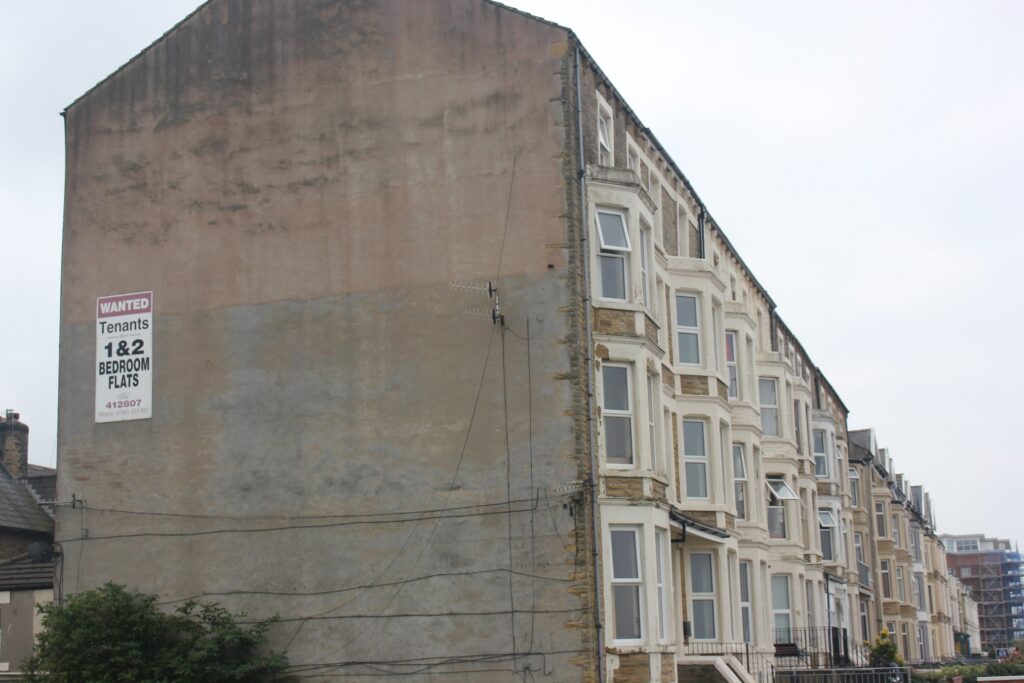
[xlvii] http://cinematreasures.org/theaters/6067
See also: http://www.modernistbritain.co.uk/post/building/Odeon+Cinema+Morecambe/
[xlviii] https://en.wikipedia.org/wiki/Odeon_Cinemas
[xlix] This alternative conclusion was both laboured and facetious: Surely the audience must have been crying into their chip butties or champagne cocktails as the pair passed through the door of Gull Grange onto the cliffs towards some higher life where Lucy would “never be tired again.”
